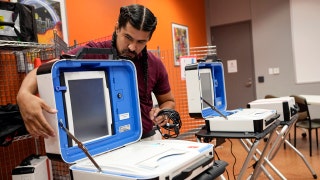Mitch McConnell says negotiations on COVID relief are progressing but two sides remain 'long way apart'
Senate Majority Leader Mitch McConnell joins Mike Emanuel with insight on 'Special Report.'
New public opinion polling in three states where long-serving Republican Senate incumbents are running for reelection indicates that they're all facing competitive challenges from their Democratic opponents.
Most at risk appears to be Sen. Susan Collins of Maine. The moderate Republican who’s served in the Senate for nearly a quarter of a century has 43% support compared with 47% for Democratic Maine House of Representatives Speaker Sara Gideon, according to a Quinnipiac University survey.
COLLINS FIRES BACK OVER 'VERY SEXIST' CAMPAIGN ATTACKS
The Quinnipiac polling, which was released on Thursday, also indicates that Sen. Lindsey Graham of South Carolina – who was first elected to the Senate nearly two decades ago – is tied at 44% with his opponent, former South Carolina Democratic Party Chair Jaime Harrison.
And a Quinnipiac survey in Kentucky shows Senate Majority Leader Mitch McConnell – who has led Senate Republicans for 13 years and served in the chamber for 35 years – with 49% support, compared with 44% for Democratic challenger Amy McGrath, a former Marine fighter pilot.
"Big political names. Huge political stakes. High anxiety for the GOP. Three GOP Senators who easily won their last reelection bids are looking over their shoulders less than three months from Election Day," Quinnipiac University polling analyst Tim Malloy said.
In Maine, Democrats have been targeting Collins since her controversial 2018 vote to confirm Supreme Court Justice Brett Kavanaugh.
Nearly half of those polled said Collins is too supportive of President Trump, with a third saying she has the right attitude toward the president, and 12% saying she is not supportive enough.
The survey indicates Maine voters have a negative 42%-49% favorable rating of their longtime senator – with Gideon showing a 40%-35% favorable rating and nearly a quarter not knowing enough about the state House speaker to form an opinion.
COLLINS REFUSES TO SAY WHETHER SHE'LL VOTE FOR TRUMP
While Collins has at times taken high-profile stands against the president, Graham – who was a vocal critic of Trump when they both ran for the 2016 GOP nomination – is now a major backer of the president.
The poll indicates that 40% of South Carolina voters say Graham’s too supportive of Trump, with 39% saying he has the right attitude toward the president, and 1 in 10 saying the senator’s not supportive enough.
"He has been a firebrand advocate for national defense and a leader of his party for 17 years -- but has Lindsey Graham's allegiance to the president put him in jeopardy?" Malloy asked. "The numbers suggest his tenure on the Hill is in trouble."
Responding to the survey, Graham campaign communications director T.W. Arrighi told Fox News that “we learned long ago not to put much confidence in media polls or outside groups who don't understand South Carolina politics. It's not our goal to generate buzz or clicks but to win a campaign. And our internal polling shows we are on track to accomplish that goal."
The Graham campaign charged that survey by Quinnipiac University dramatically under sampled Republican voters.
In Kentucky, 41% of those questioned said that the Senate Majority Leader has the right attitude toward the president, with 37% saying McConnell’s too supportive of Trump and 13% feeling he’s not supportive enough.
Can McGrath, a former Marine fighter pilot with 89 combat missions, "win a dogfight with a seasoned political powerhouse who has gone to war D.C.-style for decades?" Malloy asked. "She's giving him a run for his money.”
The GOP is fighting desperately to hold onto its Senate majority -- and right now, the president trailing Democratic challenger Joe Biden in the White House race appears to be doing Senate Republicans no favors. The party currently controls the chamber 53-47 but is defending 23 of the 35 seats up for grabs this November.
Collins is one of at least a half-dozen Republicans facing extremely challenging reelection bids. Only one Democratic incumbent, Sen. Doug Jones of Alabama, is in serious jeopardy.
The Quinnipiac University polls were conducted July 30-Aug. 3, using live telephone operators to question 909 registered voters in Kentucky; 914 registered voters in South Carolina; and 807 registered voters in Maine. The margin of error is plus or minus 3.3 percentage points in Kentucky; plus or minus 3.2 percentage points in South Carolina; and plus or minus 3.5 percentage points in Maine.













































